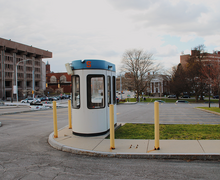New York police crack down on texting while driving
Strict legislation is cracking down on texting and driving in New York state.
Law enforcement officials issued 118,757 tickets since July 2011 for using an electric handheld device while driving. This is the result of new penalties signed into law in July, Gov. Andrew Cuomo said in a Feb. 13 press release. The legislation makes using an electronic handheld device while driving a primary traffic offense.
Officials now have the power to stop drivers solely on the basis of engaging in this activity. Previously, police could only cite a driver for the traffic violation of distracted driving if they were stopped primarily for another offense, such as speeding, according to a July 12 article by The Associated Press.
Drivers violating the new law face up to a $150 fine, according to the article.
Between Jan. 1, 2011 and July 11 before the new legislation was enacted, New York state officials issued 2,691 tickets for texting while driving. From July 12 to Feb. 7 the number of tickets issued more than doubled for the same offense at 7,495. There were 111,262 tickets issued for using a handheld electronic device while driving, according to the release.
Through changes in state regulations, Cuomo also increased the penalty for using a cellphone without a hands-free device to three points on a driver’s license rather than two, according to the AP article. A driver who accumulates 11 points within 18 months faces the possibility of having his or her license suspended for 31 days or revoked.
Boreth Uy, a junior computer engineering major, said he is fully in favor of the crackdown.
‘I am for it because it is a good law that helps to reduce accidents,’ Uy said. ‘I know people who do text and drive, but that is selfish because they are putting other people’s lives in danger.’
Barbara Fiala, commissioner of the Department of Motor Vehicles, said cellphone use causes more than 5,500 deaths and more than 440,000 injuries nationwide each year, according to the release.
Although Uy said he believes people will be deterred from texting while behind the wheel after receiving a ticket, the knowledge of the regulation alone may not be enough to stop people from violating the law.
Uy said when driving his own vehicle, he gets slightly nervous because he is aware many people drive while texting or talking on the phone.
‘I try and take precaution but accidents happen; but I do my best to make they don’t happen,’ Uy said. ‘I do not text and drive.’
Malinda Masing, a sophomore television, radio and film major, said she saw an accident take place on Main Campus because of an individual texting while behind the wheel.
She said knowing people text while driving has made her more cautious as a pedestrian.
This issue is more prevalent to people in college, as this demographic uses technology the most and may be reckless drivers, she said.
Masing said she doubts the legislation will prevent people from committing the offense because people don’t believe they are going to get caught. She said many people may have never heard of the laws in the first place.
Rich Murphy, a sophomore television, radio and film major, agreed with Masing and said he knows many individuals who have never heard of the legislation.
During last semester, a friend of Murphy’s was pulled over on campus for using his phone while driving. Murphy said he does not think his friend was actually talking or texting, but rather had the phone in his hand and was looking at it when the car was at a stop sign. An officer came up to his friend’s vehicle and gave him a ticket for just having his phone out, Murphy said.
Although Murphy said he believes this new legislation may be a little severe, ‘If it saves lives, I am for it.’
Published on February 19, 2012 at 12:00 pm





